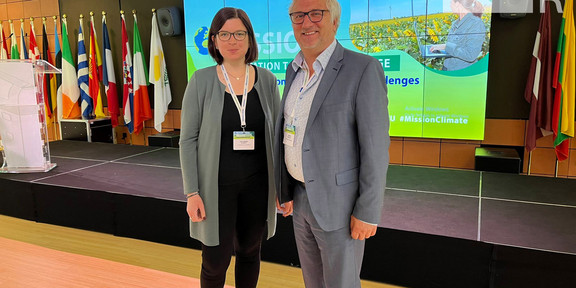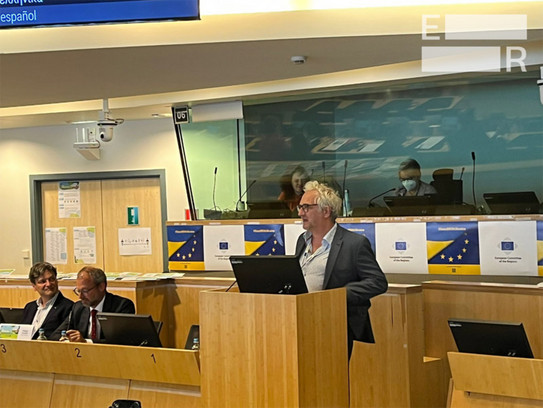Evolving Regions at the Forum on Mission Adaptation to Climate Change
- News
- Fakultät

Organized by the European Committee of the Regions, the forum presented the mission of the EU Horizon Europe program to adapt to the consequences of climate change. This is because the "Adaptation to Climate Change Mission" aims to support 150 regions and municipalities in Europe by strengthening climate resilience through the development of innovative solutions. The event brought together regional and local authorities, members of the European Parliament and the Committee of the Regions, research institutions and non-governmental organizations. The aim of the event was to take stock, identify problems and define the way forward for the mission of adaptation to climate change impacts. In addition, the status quo in Europe with regard to adaptation to climate change was described, in the course of which contributions from selected regions were presented.
The forum on European missions, which took place for the first time in this form, was held in the plenary hall of the Jaques Delors building in Brussels. On site, nearly 120 people participated in the interesting event - in addition to the several hundred viewers of the live stream. These saw several interesting and varied presentations on the European adaptation strategy. Among others, the Mission Manager Clara de la Torre presented the different European missions. The next part of the day focused on the integration of a European adaptation strategy into regional adaptation plans through the "Adaptation to Climate Change" mission.
At noon, the first signatories of the Mission Charter were announced. Here, municipalities and counties have the opportunity to sign the Charter of the Mission to Adapt to the Consequences of Climate Change. The charter can be viewed here and the link to the survey to sign the charter can be found here. Municipalities and counties have until September 2022 to take advantage of the opportunity to sign it.
At the event, four regions were given the opportunity to describe their regional challenges facing the regions as a result of climate change and what adaptations are already being made. Project will open in a new window. project from Hungary, a climate pact from the Flemish Region in Belgium and a project from the Czech Republic, Viktor Haase from the Ministry for Environment, Agriculture, Conservation and Consumer Protection of the State of North Rhine-Westphalia (MULNV NRW) and Jürgen Schultze from the Social Research Center Dortmund (sfs / TU Dortmund) took the opportunity to present the climate adaptation strategy in NRW. For this purpose, Viktor Haase outlined the effects of climate change in NRW, in order to present the NRW climate adaptation law based on this. He also went into detail about the basic strategy that is being pursued in the climate adaptation concept in NRW.
Jürgen Schultze presented the Evolving Regions project as a best-practice example, building on Mr. Haase's presentation. In addition to the general project presentation, the presentation of the topics dealt with in the regions and the key aspects of the project designed for co-productive processes, the integration of the EU mission into the project objectives was also outlined.
The recording of the forum can be accessed here (presentation by Viktor Haase and Jürgen Schultze begins at 14:58:00) and all other information about the event via this link. The information on the signing of the charter can be obtained here.
Links
- Evolving Regions | Homepage
- Evolving Regions | Projektdetails
- First Forum of the Mission Adaptation to Climate Change | Webseite
- First Forum of the Mission Adaptation to Climate Change | Präsentationen (PDF)
- EU Mission: Adaptation to Climate Change
- Charter: Mission Adaptation to Climate Change | PDF
- Mission Adaptation to Climate Change: challenges and opportunities for the regions and communities | Umfrage





